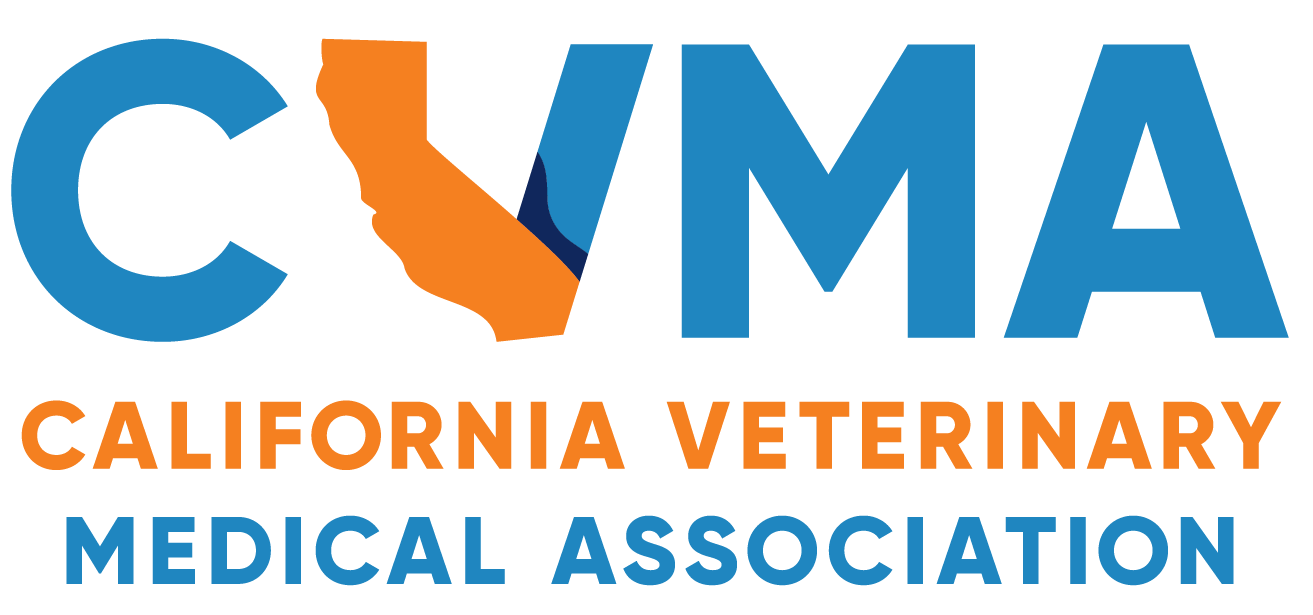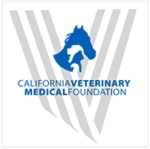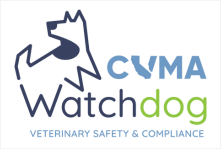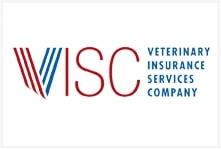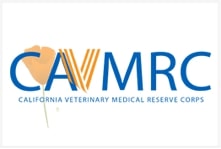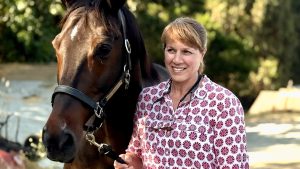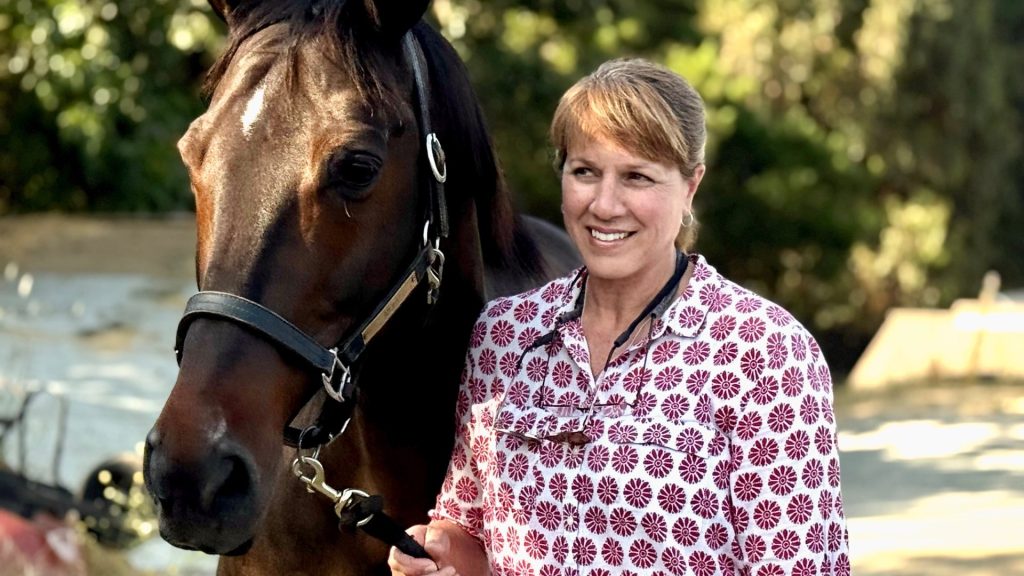
This article was originally printed in the July/August 2025 issue of the California Veterinarian magazine.
Unlike many veterinarians, I did not grow up dreaming of being a veterinarian, even though I loved animals. I graduated from UC Santa Barbara with a BA in psychology hoping to pursue a PhD and work with troubled adolescents.
I soon realized I had little control over the parents who were an influential “issue” for the children, so I became discouraged with my career path. I discovered during my undergraduate studies that I loved biology, but I could not afford to minor in it.
In addition, I loved animals and medicine. Growing up I was never exposed to female veterinarians, only male mixed animal practitioners, so I didn’t have a female role model, but I nonetheless hoped the profession might be a good fit for me. I never realized how my interest in psychology would help me in the veterinary profession, but it’s been quite valuable. No one warns you that it’s not the medicine and patients that are tough, but the clients.
In fact, it’s not much different than working with adolescents, where the challenge is working with the parents; in veterinary medicine, the challenge is working with the owners.
After returning to college for another two and a half years and taking all the science prerequisites I avoided during my BA years, I was accepted to UC Davis School of Veterinary Medicine with my first application and interview.
Veterinary school represented some of my best years, and although I was older than most of my classmates, I was in a better place mentally and able to make the most of school and learning.
During my last year, I was encouraged to pursue an equine internship even though I had focused primarily on small animals in the companion track. My equine internship at Peninsula Equine in Menlo Park, California started right after my graduation in 1997.
I was fortunate to work with a few great surgeons and learn an incredible amount about equine medicine, regulatory procedures, managing your time, and working with farriers, trainers, and clients. It was teamwork like I expected and knew from my time as a small animal veterinary assistant before veterinary school.
“All for one and one for all!” was the attitude on those late night surgical colics, recovering them and watching the sun come up. I didn’t sleep in a bed for the first three months of my internship and never worked so hard, but I loved all of it.
After a few more years spent at Peninsula Equine, I worked as a small animal clinician for a short time while it was still fresh in my mind. I needed a break from the pager and “all nighters.” Equine and small animal practice each have their pros and cons. I loved the kitten and puppy exams!
Dogs and cats age much like people but in a shorter time frame, and they often pass from conditions like cancer, organ failure, cardiovascular disease, and debilitating neurologic conditions. Although I did not have night shifts, I would spend a few hours after closing talking with frustrated or sad owners about their aging pets, and there was not much I could do about it.
Just letting them talk and listening to their concerns was all I could offer. Horses age and succumb to age-related issues like laminitis or debilitating arthritis, but for the most part horses pass quickly or acutely from catastrophic fractures, trauma, sickness, or colic. I found small animal practice more emotionally draining.
I ventured into alternative medicine like acupuncture and chiropractic hoping to travel to horse shows and work only with alternative medicine. I soon realized, however, that horses had too many conditions that could not be addressed with only alternative medicine, so I bought a radiograph and ultrasound machine and started a solo equine mobile practice out of the trunk of my Audi A4.
I didn’t sleep in a bed for the first three months of my internship and never worked so hard, but I loved all of it.”
When you own your own business, you really don’t get time off. There are very few solo practitioners partly for that reason. In addition, it is very expensive to run a small business in California, especially on the Peninsula where the cost of living is higher than most areas of the state.
Multidoctor equine veterinary hospitals/practices can barely retain equine veterinarians or attract veterinary technicians due to the long hours and cost of living compared to what they are paid in a small animal practice. Private equity companies own several of the practices with which I’m familiar, and staff retention is still difficult.
The days of family-owned or veterinarian-owned practices are fewer, at least in this area. The comradery of a group practice is unknown by so many new practitioners. It’s just a “shift” for most employees now, and many work only 2-4 days a week.
Equine practice, whether mobile or at a referral hospital, has long and unpredictable hours, has demanding clients (in the horse show world, for sure), and is physically demanding and mentally challenging. Unlike small animal practice, you must think on your feet in front of the owner or trainer.
You are not in the backroom, and you don’t always have any human buffers, such as a receptionist or technician. You work alongside farriers, grooms, and stable managers as well. How to educate and inform without discouraging or insulting someone is an ever-evolving skill.
Advances in technology have improved equine medicine, with electronic health certificates and multiple apps on our phones that are able to monitor heart rhythm, ultrasound, accept payment at the time of service, and navigate and help with dosage and treatment protocols. Just having a camera on our phone to take photos and videos has been invaluable. I started with a Nokia and then a Blackberry!
At 59 years old, I remain in the profession because half of my clients are horse trainers who are about my age, and we all support each other. I’m half joking, but I primarily still practice because the horses need help and I get the most satisfaction out of helping them feel better, move to a better situation or career, or pass on.
Several times I thought I couldn’t continue in the profession, but the relationships you build with other practitioners, clients, and patients pull you back in. The bond you develop with your canine traveling companion(s) is unforgettable.
Several times I thought I couldn’t continue in the profession, but the relationships you build with other practitioners, clients, and patients pull you back in.”
Support and get to know your fellow veterinarians. Competition and the fear of “losing clients” to another practitioner keep veterinarians from learning from each other and sharing in their successes and failures.
If my blood pressure spiked when a specific client called or I didn’t feel comfortable providing services to them, I would politely recommend other veterinarians in the area with whom they might be happier.
Letting go of difficult clients to other practitioners helped restore my confidence and enjoyment in my work. It must work for all parties involved.
